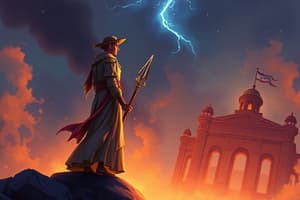Podcast
Questions and Answers
How many Supreme Court justices must agree to hear a case in order for it to receive a writ of certiorari?
How many Supreme Court justices must agree to hear a case in order for it to receive a writ of certiorari?
4
What does civil law mainly involve?
What does civil law mainly involve?
Torts and contract disputes between individuals, groups, and corporations.
Who can bring charges against an individual in criminal law?
Who can bring charges against an individual in criminal law?
Only the government.
What is the party accused of breaking the law called?
What is the party accused of breaking the law called?
Who brings the case before the court?
Who brings the case before the court?
The number of amicus curiae briefs has _____ over time. When compared to regular cases, landmark cases have _____ briefs submitted.
The number of amicus curiae briefs has _____ over time. When compared to regular cases, landmark cases have _____ briefs submitted.
People who practice judicial _____ are also known as 'strict constructionists.'
People who practice judicial _____ are also known as 'strict constructionists.'
Why does the president rarely get challenged by the Court?
Why does the president rarely get challenged by the Court?
Supreme Court justices will sometimes ignore their own political leanings or judicial philosophy if they believe the integrity of the institution is at stake.
Supreme Court justices will sometimes ignore their own political leanings or judicial philosophy if they believe the integrity of the institution is at stake.
Why does the Court overturn congressional action so rarely?
Why does the Court overturn congressional action so rarely?
In which area of law was the Court quite active in striking down presidential actions?
In which area of law was the Court quite active in striking down presidential actions?
Which criteria are used by the Supreme Court to determine whether it will hear a case? (Choose all that apply) The issue represents a controversy. The case is relevant/timely; the issue is not moot. Parties have _____ in the outcome.
Which criteria are used by the Supreme Court to determine whether it will hear a case? (Choose all that apply) The issue represents a controversy. The case is relevant/timely; the issue is not moot. Parties have _____ in the outcome.
What is the most important factor in nomination battles over federal judges?
What is the most important factor in nomination battles over federal judges?
Properly order the steps in which a case goes through the federal court system:
Properly order the steps in which a case goes through the federal court system:
Which of the following characteristics are relevant for determining which federal court has jurisdiction over a case?
Which of the following characteristics are relevant for determining which federal court has jurisdiction over a case?
What is the legal term for the interest-group-written brief that advises the Court on how to rule on a case?
What is the legal term for the interest-group-written brief that advises the Court on how to rule on a case?
What is the document called that lays out the legal belief of a minority of the Supreme Court justices about the case in question?
What is the document called that lays out the legal belief of a minority of the Supreme Court justices about the case in question?
What do attorney-written documents arguing why the Court should agree with their client called?
What do attorney-written documents arguing why the Court should agree with their client called?
What does the document called the opinion lay out?
What does the document called the opinion lay out?
Rank each court based on the number of cases it hears, from most to fewest:
Rank each court based on the number of cases it hears, from most to fewest:
Why does the Supreme Court rarely challenge the actions of executive agencies?
Why does the Supreme Court rarely challenge the actions of executive agencies?
In which of the following ways might the position of the chief justice affect the operation or outcome of a Supreme Court case?
In which of the following ways might the position of the chief justice affect the operation or outcome of a Supreme Court case?
Which act specifically gave the Supreme Court the authority to reverse state laws and constitutions?
Which act specifically gave the Supreme Court the authority to reverse state laws and constitutions?
What is one characteristic of civil cases?
What is one characteristic of civil cases?
Which statement best describes the role of political ideology in justices' decisions?
Which statement best describes the role of political ideology in justices' decisions?
What is the name given to the Supreme Court's most important power?
What is the name given to the Supreme Court's most important power?
What happens when a federal district court grants a writ of habeas corpus to a defendant convicted in a state court?
What happens when a federal district court grants a writ of habeas corpus to a defendant convicted in a state court?
Why is legal precedent important to the courts?
Why is legal precedent important to the courts?
When does the Supreme Court have original jurisdiction over a case?
When does the Supreme Court have original jurisdiction over a case?
The Supreme Court is an active participant in the legislative process, often ruling acts of Congress unconstitutional.
The Supreme Court is an active participant in the legislative process, often ruling acts of Congress unconstitutional.
How does the system attempt to mitigate the danger of final decisions made by federal appeals courts?
How does the system attempt to mitigate the danger of final decisions made by federal appeals courts?
Which statements about the Supreme Court's opinions on a case are correct?
Which statements about the Supreme Court's opinions on a case are correct?
What factors influence the Supreme Court's decision-making practices?
What factors influence the Supreme Court's decision-making practices?
The _____ formally nominates judges for federal district courts. After nomination, the candidate must be considered by the _____ Committee.
The _____ formally nominates judges for federal district courts. After nomination, the candidate must be considered by the _____ Committee.
Why do interest groups try to develop a 'pattern of cases'?
Why do interest groups try to develop a 'pattern of cases'?
Supreme Court nominees tend to share the same ideologies as the presidents who appoint them.
Supreme Court nominees tend to share the same ideologies as the presidents who appoint them.
What is one core aspect of the solicitor general's job?
What is one core aspect of the solicitor general's job?
What is the name of the member of the Supreme Court who presides over public sessions?
What is the name of the member of the Supreme Court who presides over public sessions?
What allows dissenting opinions to try to persuade future justices?
What allows dissenting opinions to try to persuade future justices?
Which of the following are ways Congress can check the power of the federal courts?
Which of the following are ways Congress can check the power of the federal courts?
What clause of the Constitution gives the Supreme Court the authority to rule on cases involving state laws and state constitutions?
What clause of the Constitution gives the Supreme Court the authority to rule on cases involving state laws and state constitutions?
When will an appellate court agree to hear an appeal?
When will an appellate court agree to hear an appeal?
Flashcards are hidden until you start studying
Study Notes
Supreme Court and Legal Concepts
- Writ of Certiorari: Requires the agreement of 4 justices for the Supreme Court to hear a case.
- Civil Law: Governs torts and contract disputes between private parties, including individuals, groups, and corporations.
- Criminal Law: Only the government can initiate legal charges against an individual.
- Parties Involved:
- Defendant: The accused party in a legal proceeding.
- Plaintiff: The party bringing the case to court.
Case Submission and Legal Briefs
- The number of amicus curiae briefs has increased over time, and landmark cases attract significantly more briefs than regular cases.
- Judicial Restraint: Practitioners, also known as "strict constructionists," interpret the Constitution literally.
- Supreme Court rarely challenges presidential actions as it requires presidential support for enforcement and political alignment in judicial nominations.
Supreme Court Dynamics
- Justices occasionally set aside personal political leanings for the institution's integrity.
- The Court rarely overturns congressional actions, typically interpreting laws to maintain their constitutionality.
- Active in prisoners' rights but generally defers to presidential authority.
Criteria for Hearing Cases
- The Supreme Court evaluates cases based on:
- Controversy relevance.
- Relevance and timeliness of the issue.
- Standing of parties involved.
Federal Judicial System and Processes
- Nominations: Partisanship is the most significant factor in the appointment of federal judges.
- Court Hierarchy: Progression of cases goes through U.S. district courts, U.S. courts of appeals, and finally the U.S. Supreme Court.
- Federal jurisdiction considerations include the parties, subject matter, and filing location.
Legal Documents and Opinions
- Amicus Curiae Brief: A report written by an interest group to advise the Court.
- Dissenting Opinion: Represents the minority view on the Supreme Court.
- Brief: Document crafted by attorneys to argue for their client's position.
- Opinion: The Court's formal legal reasoning and ruling on a case.
Supreme Court Authority and Jurisdiction
- Judicial review is the Supreme Court's fundamental power to declare government actions unconstitutional.
- Original jurisdiction cases include disputes involving foreign ambassadors and state government conflicts.
Political Influence and Justices
- Political ideology affects justices' decision-making behaviors.
- Supreme Court justices are often aligned ideologically with the president who appointed them.
Checking Judicial Power
- Congress can limit federal courts by adjusting the number of judges or altering their jurisdiction.
- The Supremacy Clause grants the Supreme Court authority over state laws and constitutions.
Additional Legal Processes
- The solicitor general reviews federal cases prior to their appeal to the Supreme Court.
- Chief Justice: Presides over public sessions of the Supreme Court.
Case Appeal Processes
- Appellate courts consider appeals when there is evidence of legal errors during the trial court's proceedings.
Studying That Suits You
Use AI to generate personalized quizzes and flashcards to suit your learning preferences.




